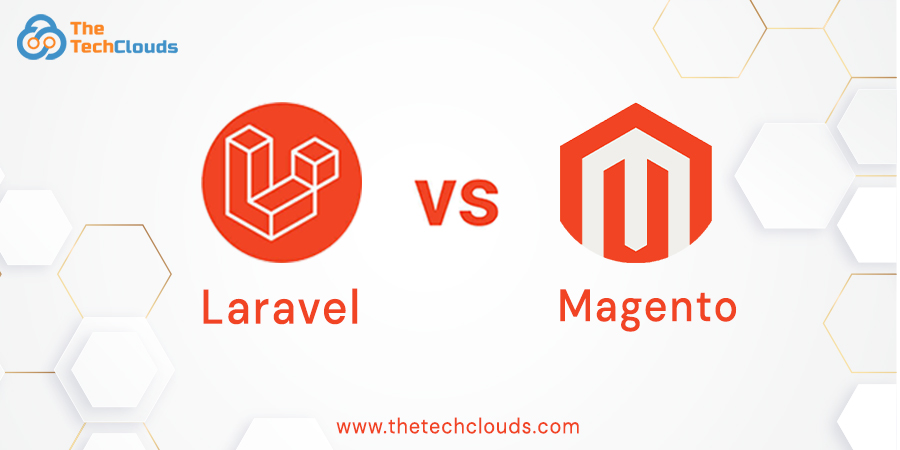We've seen how conventional commerce systems have been overtaken by eCommerce in recent years — a development that many internet firms must consider today. Currently, firms that have just begun the process of establishing an online store must choose an appropriate framework to meet their demands. Magento vs Laravel are two of the most popular frameworks for constructing eCommerce businesses in a market with several well-designed eCommerce systems. Both offer advantages and disadvantages, but which is the best for your company? In this blog, we'll compare and contrast Magento and Laravel, as well as look at the benefits of each e-commerce solution to help you determine which is best for you.
Magento
Magento is a PHP-based open-source eCommerce platform. Magento and Magento development companies have been growing for over a decade, offering merchants across the world a pragmatic and dependable strategy towards becoming major leaguers in the online community.
Laravel
Laravel is a prominent PHP framework with a number of features that make it appealing to developers. It's an open-source server-side framework with MVC design for logical components of your application's back-end architecture, making it simple to use and adaptable across multiple devices or browsers. You may also construct an omnichannel eCommerce platform with Laravel that flawlessly links all of your physical and digital businesses.
Why Are E-commerce Frameworks Essential for Your Online Store?
Using robust frameworks like Laravel or Magento gives your e-commerce website structure, scalability, and security. They streamline development, enable custom features, and ensure smooth integration with payment gateways, inventory systems, and SEO tools, empowering your business to grow faster and deliver a better user experience.
Comparison:
There is a checklist that should be followed while choosing an e-commerce system. A good solution has an intuitive user interface, a simple platform, a well-stocked library, a testing function, the ability to customize, popularity, and community support as suggested by good web development companies.
Laravel vs. Magento: What's the Difference in Technology?
When comparing Magento Vs Laravel, first we will start with comparing their technologies. Magento has long been regarded as one of the greatest e-commerce platforms. It was, in fact, at the time of its release. However, because the internet is such a fast-paced sector, it is critical to keep current. With its innovative technology, Laravel is more relevant in the present context.
MVC Structure in Laravel vs. Magento
Because of its user-friendly MVC design, Laravel emerges as the clear victor. Many web developers have remarked on how much simpler it is to use than Magento. The latter case has a complicated UI.
Laravel vs. Magento: Availability Ease
For more than a decade, Magento has been on the market. And, as a result of its popularity, it is far easier to discover superior Magento developers than Laravel experts.
Laravel vs. Magento: Which Is More Cost-Effective?
Though the price varies on the level of customization, Laravel's payment mechanism is less expensive. However, because it is still a relatively new framework, there aren't as many developers available to match the demand. Magento has the upper hand in this situation. 
Laravel vs. Magento: Libraries are well-stocked
Both Magento and Laravel have extensive preset and template libraries. Laravel, on the other hand, goes a step farther in terms of customisation. Magento has its own settings that may be tweaked to a certain extent.
Laravel vs. Magento: Libraries are well-stocked
Both Magento and Laravel have extensive default and theme libraries. Laravel, on the other hand, goes a step farther in terms of customisation. Magento has its own settings that may be tweaked to a certain extent.
Laravel vs. Magento: Usability and Simplicity
Nothing is more aggravating than the time-consuming chore of debugging and troubleshooting. It reduces productivity and puts your patience to the test. One of the major areas where Magento falls short is in this regard. It is an unstable platform because of the ongoing need to troubleshoot, whereas Laravel's underlying structure is more obvious and easier to comprehend. With Laravel, you'll have less issues.
Read: Reasons to Choose Custom Ecommerce Solutions!
Security vs. Laravel vs. Magento
Both are open-source platforms, making them vulnerable to hacking.
Community Support in Laravel vs. Magento
Magento's community support is stronger due to its widespread popularity. If you ever have a problem, Magento's community help is far more accessible than Laravel's.
Laravel vs. Magento: Code Complexity
Laravel employs PHP-based syntax with ORM-based code instead of Magento's usual complicated SQL programming, making database maintenance more manageable. The top Laravel developers from renowned web development company can help rapidly grasp other people's code. As a result, it is the most widely used platform in the business.
Magento vs Laravel: SEO-Friendly
Magento has built-in SEO tools like metadata management, sitemaps, and structured URLs. Laravel requires manual or package-based integration for SEO, giving flexibility but requiring more developer effort to achieve similar results.
Magento vs Laravel: Testing
Laravel offers PHPUnit integration, Laravel Dusk, and built-in testing features, making test-driven development easier. Magento also supports testing but is bulkier and more complex to test due to its monolithic structure. For precision and efficiency, developers often rely on professional software testing services to ensure a flawless eCommerce experience.
Magento vs Laravel: Technology
Magento is a complete e-commerce platform with built-in features, powered by PHP and heavily reliant on XML configurations. Laravel is a modern PHP framework offering freedom to build highly scalable, tailored solutions with clean architecture.
Magento vs Laravel: Budget-Friendly
Laravel is generally more budget-friendly for startups since it allows custom development without licensing fees. Magento, especially Adobe Commerce (Enterprise), can be expensive due to licensing, server demands, and longer development cycles.
Magento vs Laravel: User Satisfaction
User satisfaction with Laravel stands at approximately 97%, owing to its flexibility, clean architecture, and developer-friendly tools. Magento, while robust, has a satisfaction score of about 90%, primarily due to its complexity and resource intensity.
Magento vs Laravel – Head-to-Head Comparison Table
| Feature | Magento | Laravel |
|---|---|---|
| Platform Type | Complete eCommerce platform | PHP-based web application framework |
| Learning Curve | Steep and complex | Easier and developer-friendly |
| Customization | Limited without extensions | Highly customizable |
| Performance | Heavier, resource-intensive | Lightweight and faster |
| Cost | High (especially Adobe Commerce version) | More budget-friendly |
| SEO Tools | Built-in SEO features | Requires package-based SEO setup |
| Security | Strong but vulnerable if misconfigured | Security handled at code level |
| Community Support | Extensive and well-established | Growing but smaller |
| Libraries & Extensions | Rich marketplace with official extensions | Flexible use of external packages |
| Testing Tools | Supported but complex | Integrated & supports real-time testing |
| Mobile Responsiveness | Built into themes | Fully responsive with custom development |
| Best for | Large enterprises, feature-heavy eCommerce | Startups & custom eCommerce builds |
Summary
For enterprises seeking a content management system, both Magento and Laravel are viable options. This article has explored the essential features and capabilities of both frameworks in order to help you compare them more effectively. Read to find out more!


